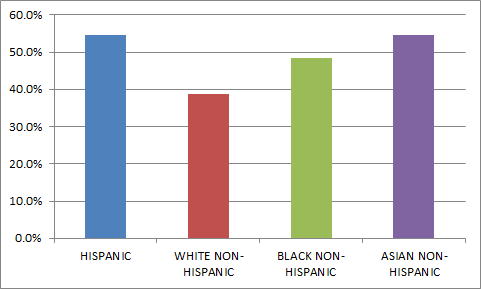Using data from Experian Marketing Services’ Simmons National Hispanic Consumer Study that was collected in the twelve months ending on August 31, 2012, I created crosstabulations with self identification as Hispanic/Latino, Asian, African American/Black, or White by those who agreed a lot or a little (combined) with the statement “I find it hard to resist my children’s requests for non-essential purchases” and “I enjoy shopping with my children.” The results for both have striking similarities, not surprisingly, perhaps, as seen in the charts below:
I Find it Hard to Resist My Children’s Requests for non-Essential Purchases
I Enjoy Shopping with My Children
Hispanics are quite a bit more likely to enjoy shopping with their kids and also to yield to their requests. They are followed by Asians who show a similar pattern when it comes to enjoying the shopping experience with their kids, but not so in yielding to their requests for non-essential purchases. Perhaps the Asian approach to child rearing, which is known to be stricter, accounts for their lack of yielding. Non-Hispanic Whites and African Americans are less likely than Latinos to enjoy the shopping experience with kids and yielding to their children.
The meaning of these findings is likely to relate to the way in which these consumers interpret their relationship with their children. In particular, I have heard Hispanics many times articulate the notion that they want their kids to have what they did not have as children. They have also indicated they feel guilty for not doing the absolute best they can for their kids.
Hispanics are at a stage in their immigration and economic development where pleasing their children and families in general is a luxury they could not afford before. What they do in life is for their children and want them to be happy as they grow up. They seem to place a very strong value in their sense of fulfillment. Perhaps Whites have become habituated to living in a culture of abundance where kids can wait to fulfill their desires and where shopping represents labor rather than fun.
This data shows that it is not just a stereotype but an actual trend that Latinos shop in family groups and have fun doing so. Asians show a more complex pattern in which they enjoy the shopping experience with kids, but are strictest in pleasing kids as compared with anyone else. The implications for marketers are that Latino children in particular can be important influences in the decision making regarding purchases of products and that they cannot be ignored in the overall communication and placement plan.
As we have discovered in other pieces of research, collective decision making is more prevalent among Latinos than among other groups. Thus, the different parts of the decision making process need to be taken into consideration.
The data used here is from Experian Marketing Services’ Simmons National Hispanic Consumer Study and was collected from August 1, 2011 to August 31, 2012. The sample of respondents with children at home contained 2,955 Latinos/Hispanics, 3,645 non-Hispanic Whites, 552 non-Hispanic African American/Black, and 253 non-Hispanic Asians.